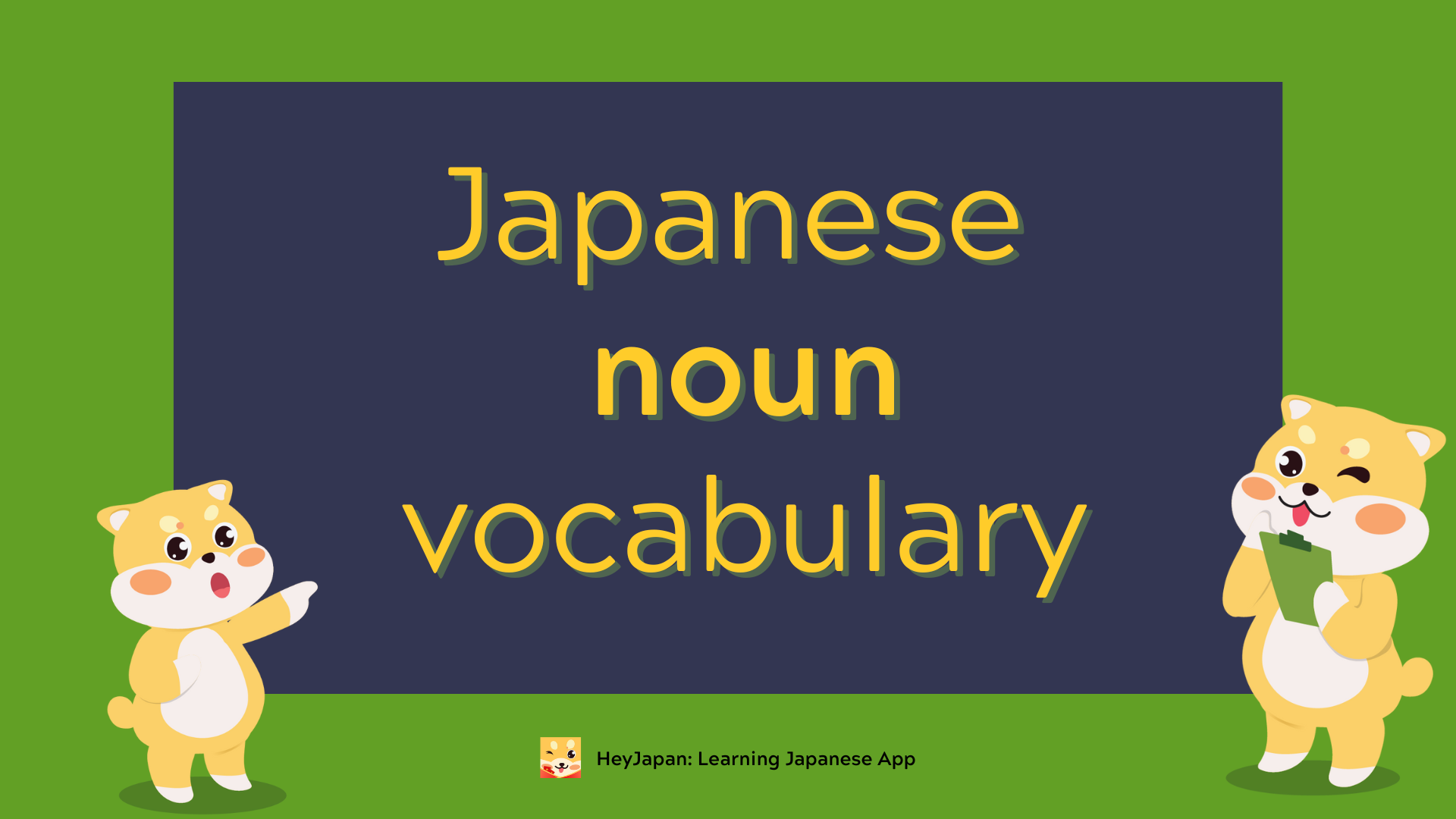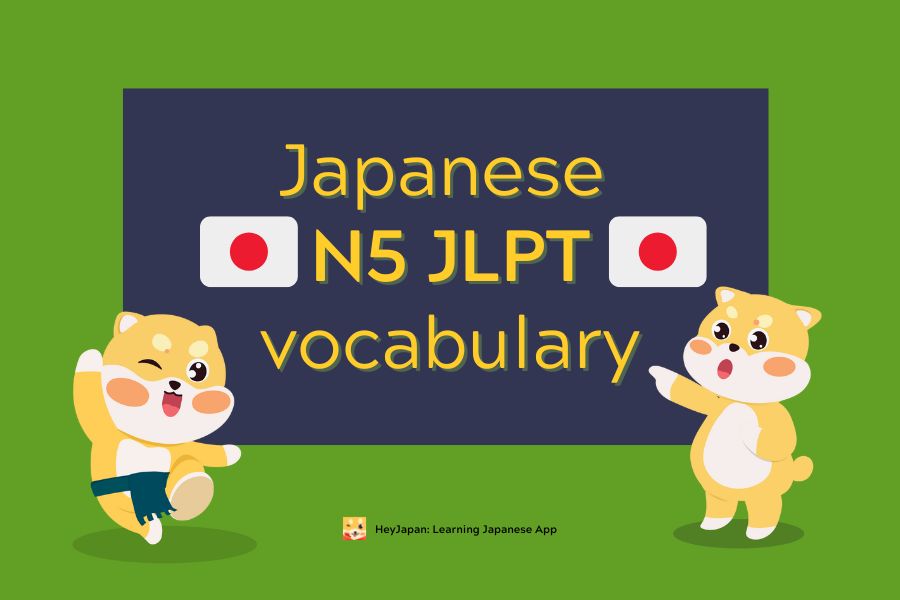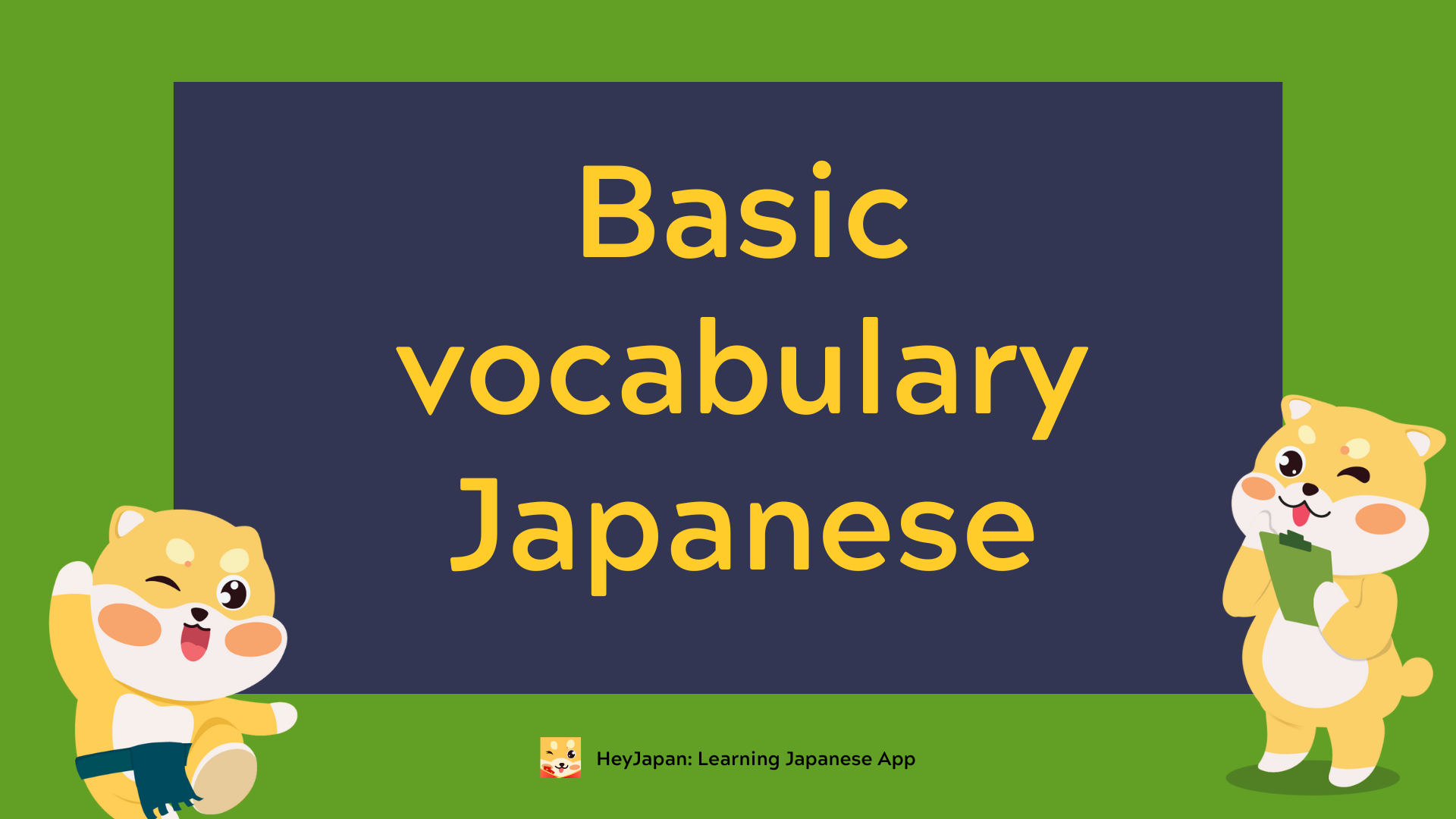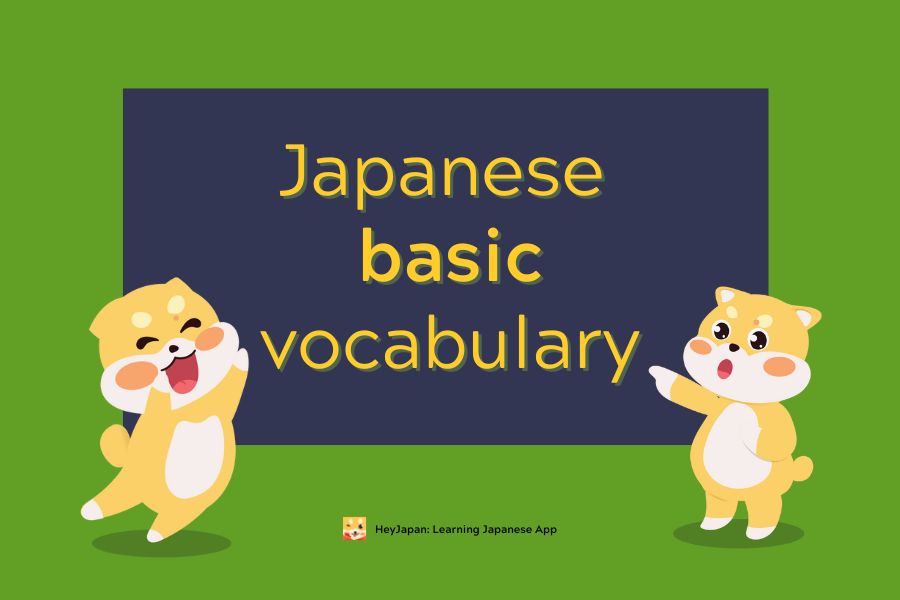- What Are Nouns in Japanese?
- List of Common Japanese Nouns by Topic
- 1. Family
- 2. Work/Job
- 3. Food
- 4. Time
- 5. Sports
- 6. Education
- 7. Travel
- 8. Emotions
- 9. Daily Items
- 10. Animals
- Effective Ways to Learn Japanese Nouns
- Common Mistakes When Learning Japanese Nouns
- Benefits of Learning Japanese Nouns
Learning Japanese vocabulary is an essential step for learners who want to communicate confidently and effectively. Specifically, nouns play a crucial role in sentence structure and daily conversations.
This article will introduce you to common Japanese nouns categorized by useful topics, helping you not only familiarize yourself with essential vocabulary but also improve your ability to use Japanese in real-life situations.
What Are Nouns in Japanese?
In Japanese, nouns are words used to refer to people, objects, places, or concepts. Nouns are fundamental in constructing sentences and help learners express clear meanings. They can range from basic terms like "family," "work," and "food" to more complex vocabulary related to specific topics.
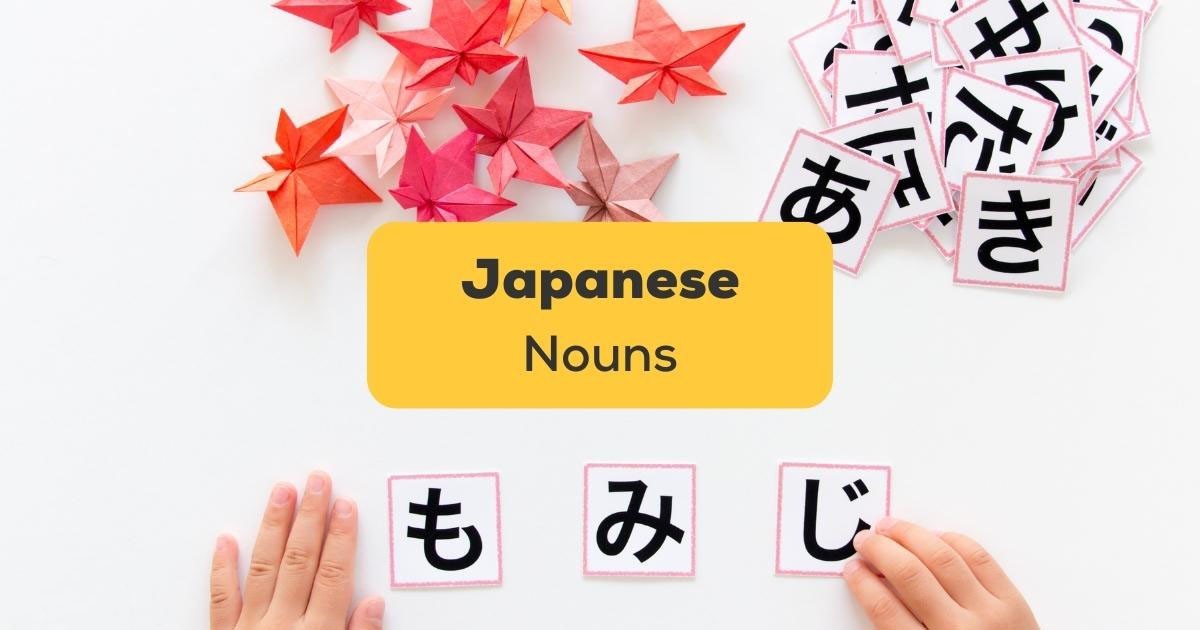
List of Common Japanese Nouns by Topic
Below is a list of common Japanese nouns categorized by topic, helping you easily learn and apply them in daily conversations.
1. Family

- 家族 (かぞく, kazoku) - Family
- 母 (はは, haha) - Mother
- 父 (ちち, chichi) - Father
- 兄 (あに, ani) - Older brother
- 姉 (あね, ane) - Older sister
- 弟 (おとうと, otouto) - Younger brother
- 妹 (いもうと, imouto) - Younger sister
- 祖父 (そふ, sofu) - Grandfather
- 祖母 (そぼ, sobo) - Grandmother
Readmore : Japanese Family Vocabulary – Essential Words & Usage
2. Work/Job

- 会社 (かいしゃ, kaisha) - Company
- 仕事 (しごと, shigoto) - Job
- 上司 (じょうし, joushi) - Boss
- 部下 (ぶか, buka) - Subordinate
- 同僚 (どうりょう, douryou) - Colleague
- 面接 (めんせつ, mensetsu) - Interview
- 給料 (きゅうりょう, kyuuryou) - Salary
- 職場 (しょくば, shokuba) - Workplace
Readmore: 23+ Jobs in Japanese - Occupations Vocabulary
3. Food

- 食べ物 (たべもの, tabemono) - Food
- ご飯 (ごはん, gohan) - Rice (also means meal)
- パン (pan) - Bread
- 野菜 (やさい, yasai) - Vegetables
- 果物 (くだもの, kudamono) - Fruits
- 魚 (さかな, sakana) - Fish
- 肉 (にく, niku) - Meat
- 牛乳 (ぎゅうにゅう, gyuunyuu) - Milk
- 卵 (たまご, tamago) - Eggs
Readmore: 33+ Vegetables in Japanese Vocabulary - Words In Use
4. Time

- 時間 (じかん, jikan) - Time
- 朝 (あさ, asa) - Morning
- 昼 (ひる, hiru) - Afternoon
- 夜 (よる, yoru) - Night
- 週 (しゅう, shuu) - Week
- 月 (つき, tsuki) - Month
- 年 (ねん, nen) - Year
- 日 (にち, nichi) - Day
Readmore: Learn Japanese Time Vocabulary – Essential Terms & Phrases
5. Sports

- スポーツ (supootsu) - Sports
- サッカー (sakkaa) - Soccer
- バスケットボール (basukettobooru) - Basketball
- 野球 (やきゅう, yakyuu) - Baseball
- 水泳 (すいえい, suiei) - Swimming
- テニス (tenisu) - Tennis
- ランニング (ranningu) - Running
- 自転車 (じてんしゃ, jitensha) - Bicycle
6. Education

- 学校 (がっこう, gakkou) - School
- 学生 (がくせい, gakusei) - Student
- 教師 (きょうし, kyoushi) - Teacher
- 授業 (じゅぎょう, jugyou) - Class
- テスト (tesuto) - Test
- 宿題 (しゅくだい, shukudai) - Homework
- 教科書 (きょうかしょ, kyoukasho) - Textbook
- 試験 (しけん, shiken) - Exam
7. Travel

- 旅行 (りょこう, ryokou) - Travel
- 飛行機 (ひこうき, hikouki) - Airplane
- 地図 (ちず, chizu) - Map
- ホテル (hoteru) - Hotel
- 観光 (かんこう, kankou) - Sightseeing
- 観光地 (かんこうち, kankouchi) - Tourist spot
- 空港 (くうこう, kuukou) - Airport
- チケット (chiketto) - Ticket
8. Emotions

- 喜び (よろこび, yorokobi) - Joy
- 悲しみ (かなしみ, kanashimi) - Sadness
- 幸せ (しあわせ, shiawase) - Happiness
- 怒り (いかり, ikari) - Anger
- 驚き (おどろき, odoroki) - Surprise
- 恥 (はじ, haji) - Shame
9. Daily Items
- テーブル (teeburu) - Table
- 椅子 (いす, isu) - Chair
- 本 (ほん, hon) - Book
- ペン (pen) - Pen
- 時計 (とけい, tokei) - Watch
- 電話 (でんわ, denwa) - Phone
- シャワー (shawaa) - Shower
10. Animals

- 犬 (いぬ, inu) - Dog
- 猫 (ねこ, neko) - Cat
- 鳥 (とり, tori) - Bird
- 魚 (さかな, sakana) - Fish
- 馬 (うま, uma) - Horse
- 象 (ぞう, zou) - Elephant
Effective Ways to Learn Japanese Nouns
To learn Japanese nouns effectively, consider implementing the following methods:
- Use flashcards: Create flashcards with images to help you memorize nouns quickly. Apps like Anki or Quizlet are great for reviewing vocabulary.
- Learn by topic: Focus on familiar topics like family, work, food, and travel. This will help you relate new vocabulary to practical situations.
- Practice conversation: Form simple sentences using the nouns you've learned to improve your ability to use them in context.
- Engage in reading and listening: Read books, listen to podcasts, or watch Japanese videos. This will expose you to nouns used in real-life contexts and reinforce what you've learned.
Common Mistakes When Learning Japanese Nouns
Some common mistakes to avoid include:
- Misusing nouns in the wrong context: For example, using "お兄さん" (onii-san) to refer to an older brother in a formal setting when "兄" (ani) is more appropriate in casual conversations.
- Confusing similar nouns: Distinguishing between nouns like 兄 (ani) and お兄さん (onii-san), or 先生 (sensei) and 教師 (kyoushi), which are used in different contexts.
Benefits of Learning Japanese Nouns
- Improved communication: Learning nouns helps you build a strong language foundation and makes conversations more fluid.
- Better preparation for JLPT: Nouns appear frequently in the JLPT exams, particularly in the reading and listening sections.
- Real-life application: Knowing nouns allows you to understand and participate in everyday conversations more easily.
Learning Japanese nouns will help you communicate more effectively and improve your reading skills for everyday situations. Make sure to practice regularly and use modern learning tools like flashcards and listening exercises to absorb vocabulary naturally. Start with familiar topics and gradually move on to more complex subjects to expand your vocabulary.
Happy learning!

